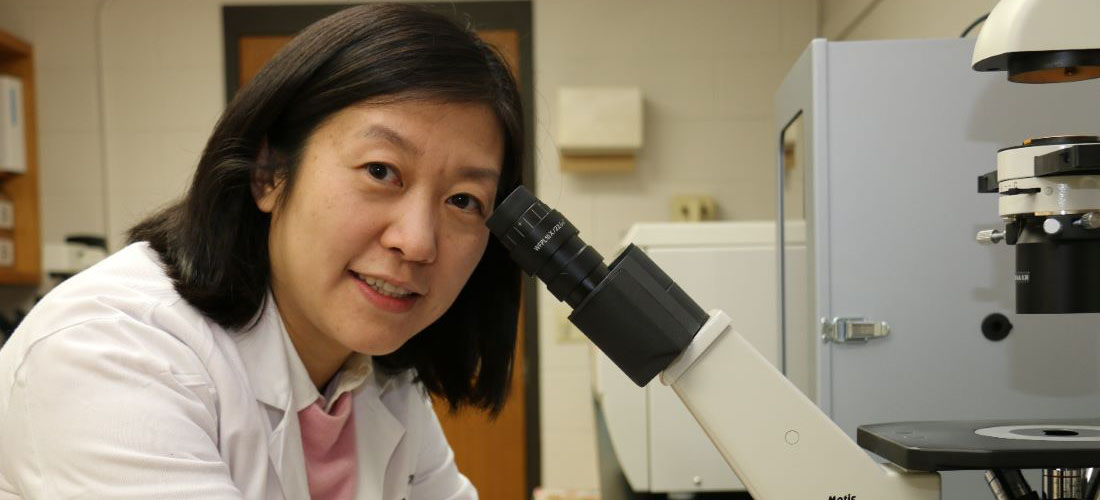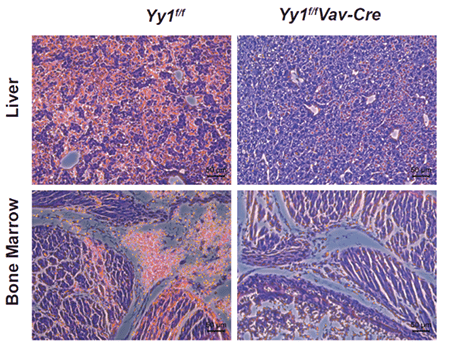Profile of a Veterinary Scientist: Xuan Pan, V.M.D., Ph.D., DACVIM

For as long as she can remember, Dr. Xuan Pan had dreamed of a career in veterinary medicine. A long-time animal lover who grew up with pets in her household, Dr. Pan left her home in Nanjing, China, to pursue a veterinary degree in the United States. Her driving passion all along, she explained, has been the advancement of animal health and welfare.
“Growing up, I always wanted to be a veterinarian,” Dr. Pan reflected. “But in China at the time, most veterinary culture was focused on agriculture and husbandry. The veterinary programs in the United States were more aligned with my dreams.”
Dr. Pan attended the University of Pennsylvania School of Veterinary Medicine (UPenn SOVM) as a V.M.D–Ph.D. student and began to acquire the unique skillset that would serve her in her career. She discovered quickly that American veterinary programs are rigorous, and she adapted to overcome new cultural, financial, and personal challenges.
During her first semester, Dr. Pan’s greatest fear was failing a class, because it would result in her expulsion. Keeping pace with the class lectures in English was particularly challenging; Dr. Pan recounted that initially, she used a dictionary to translate classmates’ notes word-by-word. Her hard work paid off; in that first semester, Dr. Pan was ranked toward the top of her class. As she progressed in her graduate studies, Dr. Pan was inspired to pursue a career in veterinary research centered on the improvement of health for both animals and people.
UPenn SOVM supports a robust research program, enabling students to develop skills in both clinical and basic scientific study. As a veterinary graduate student, Dr. Pan focused her research studies on cancer biology. She was supported by an ORIP T32 training grant, which provided her a tuition waiver and stipend to complete her graduate studies.
Now an associate professor at the University of Wisconsin–Madison School of Veterinary Medicine (UW SVM), Dr. Pan specializes in the study of lymphocyte development and hematopoiesis. Her work contributes to a body of knowledge that is relevant to the health of both animals and humans, and her experience in veterinary and laboratory settings provides her a unique perspective within the cancer research community.
Many researchers use traditional laboratory animals (e.g., rodents) as models for cancer. Dr. Pan’s work on companion animals (e.g., dogs and cats) has provided unique insights into cancer biology because, like humans, companion animals develop naturally occurring cancers that reflect their diet and environment. Dr. Pan is exploring the fundamental processes that influence hematopoiesis—the formation and turnover of blood cellular components—which is critical to translational research surrounding the progression and treatment of hematopoietic cancers (e.g., B-cell lymphoma).
Supported by a K01 Special Emphasis Research Career Award (SERCA) grant (K01OD020153) from ORIP, Dr. Pan is investigating mechanistic questions of how a transcriptional repressor protein, Yin Yang 1 (YY1), controls hematopoietic stem cell (HSC) self-renewal and differentiation. The award, she explained, has supported her in her transition from a veterinary clinician to an independent scientist.

Dr. Pan’s work has demonstrated that YY1 is a unique stem cell–promoting factor; elevation of YY1 expression increases HSCs and decreases B cells in vivo.1,2 Building on her K01 award, Dr. Pan has successfully applied for an R01 award from the National Heart, Lung, and Blood Institute (R01HL146540) and an R03 award from ORIP (R03OD026603). Under her R01 award, she is exploring the mechanisms and pathways in which YY1 is involved. Under her R03 award, she is generating key mouse models and molecular insights to characterize control of high-order chromosome structure in HSC biology and the impact of YY1 regulation in hematopoiesis.
With the guidance of her K01 mentor, Dr. Emery Bresnick, Dr. Pan presently is establishing her research laboratory at UW SVM. In particular, the K01 award has allowed Dr. Pan to refine her skillset in team management. She explained that maintaining research productivity during the COVID-19 pandemic has posed a challenge for many investigators; the K01 award has provided her valuable support during this crucial period in her career.
“[Support for veterinary scientists] is so critical,” Dr. Pan emphasized. “This award provided a protective time to develop the skills for my research career, and it gave me designated time to focus on my research. It’s a great program.”
For more information on the SERCA K01 award, please visit the ORIP SERCA Guidelines page.
References
1 Lu Z, Hong CC, Kong G, et al. Polycomb group protein YY1 is an essential regulator of hematopoietic stem cell quiescence. Cell Rep. 2018;22(6):1545–1559. doi:10.1016/j.celrep.2018.01.026.
2 Pan X, Jones M, Jiang J, et al. Increased expression of PcG protein YY1 negatively regulates B cell development while allowing accumulation of myeloid cells and LT‑HSC cells. PLoS ONE. 2012;7(1):e30656. doi:10.1371/journal.pone.0030656.



